外研版中考英语总复习(上册)第二篇 课本要点梳理 第五讲 八上 Modules 1-6
文档属性
| 名称 | 外研版中考英语总复习(上册)第二篇 课本要点梳理 第五讲 八上 Modules 1-6 |
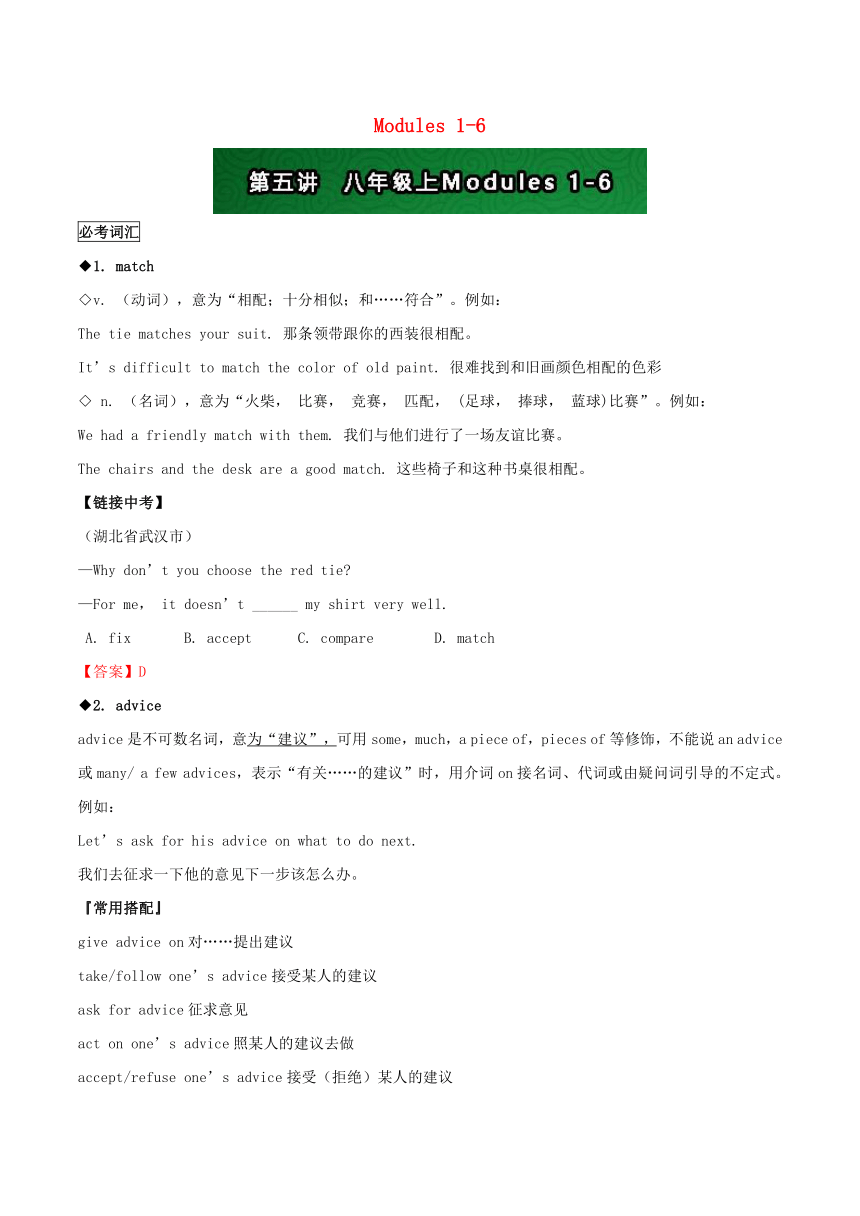
|
|
| 格式 | zip | ||
| 文件大小 | 40.6KB | ||
| 资源类型 | 教案 | ||
| 版本资源 | 外研版 | ||
| 科目 | 英语 | ||
| 更新时间 | 2016-08-26 00:00:00 | ||
图片预览

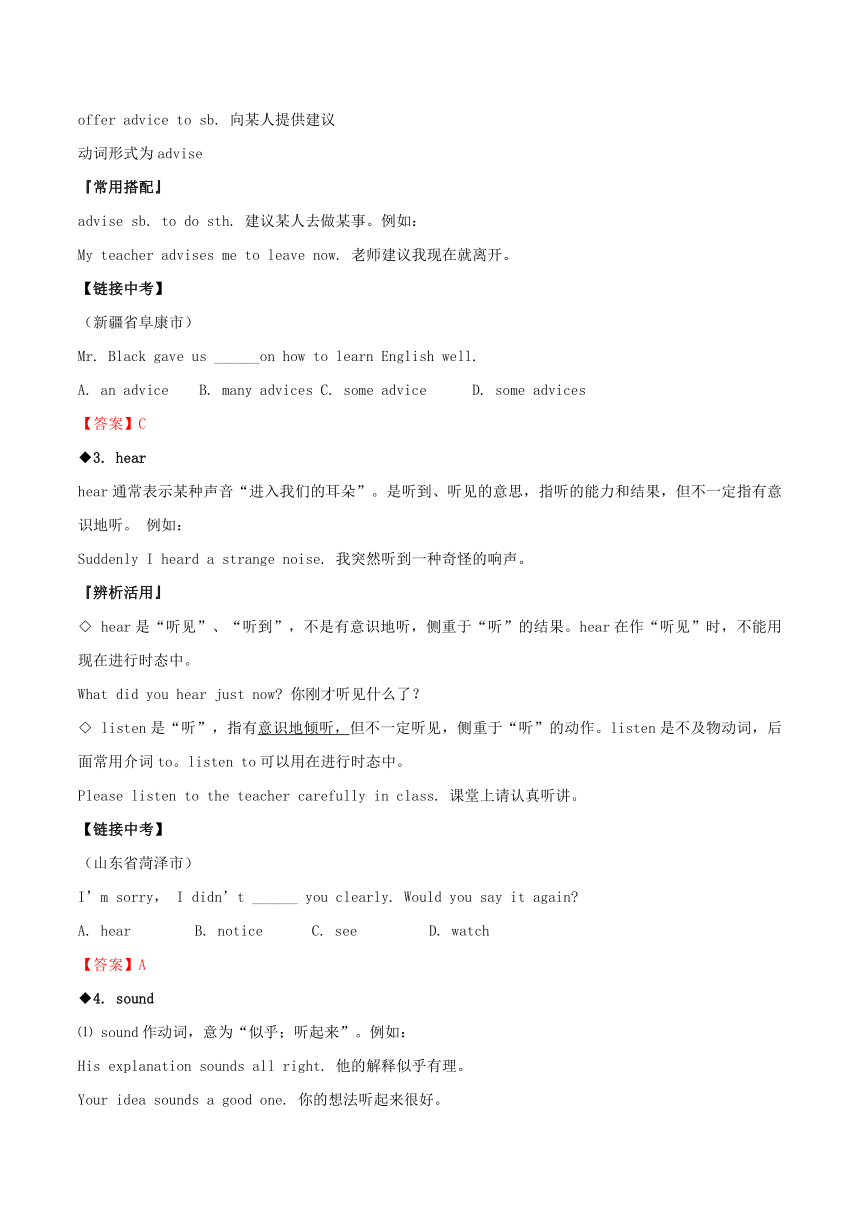
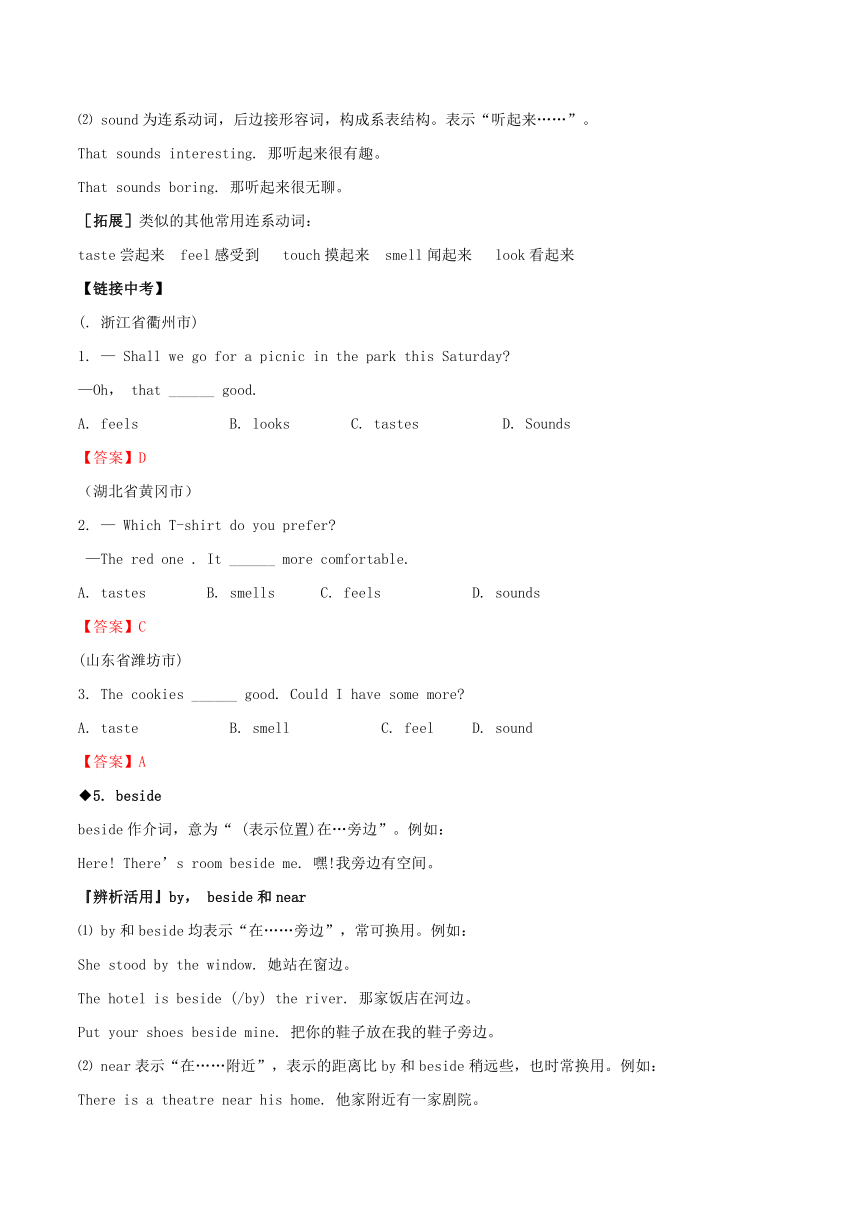
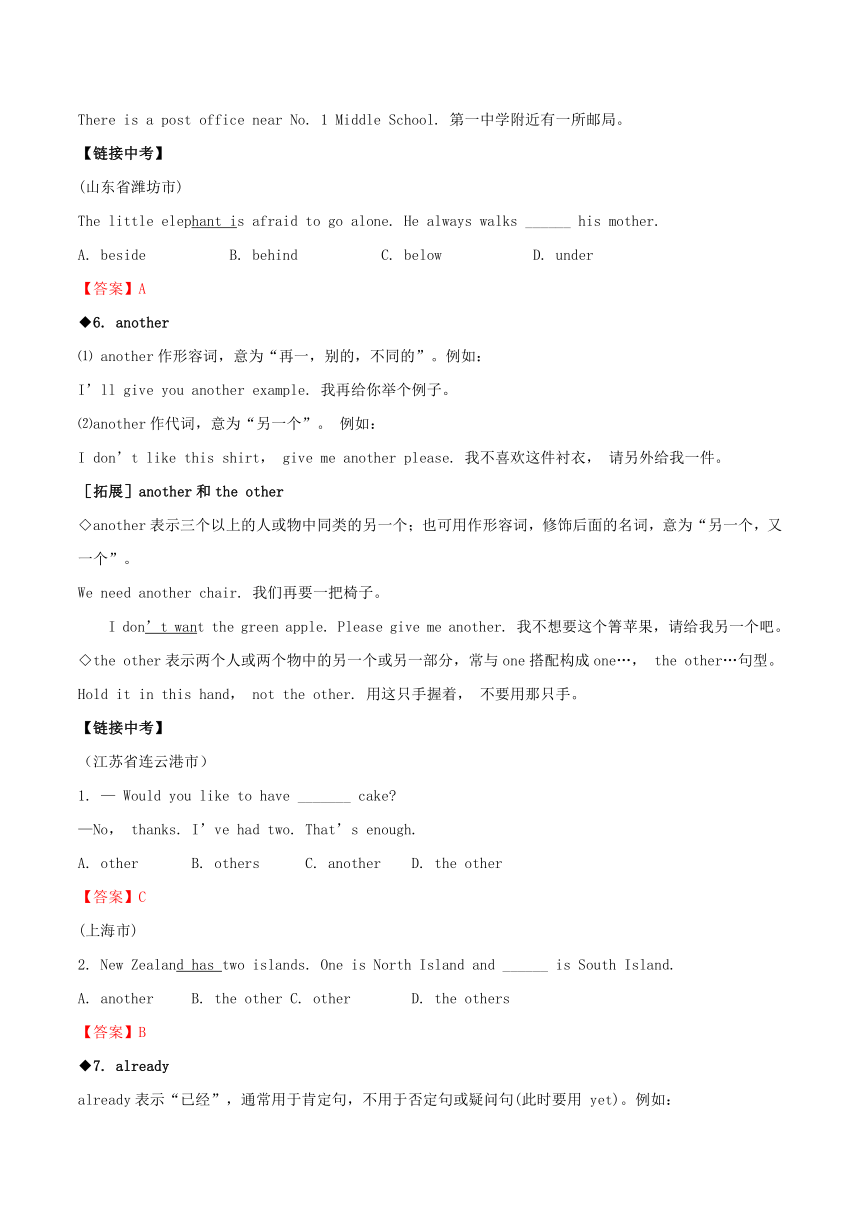
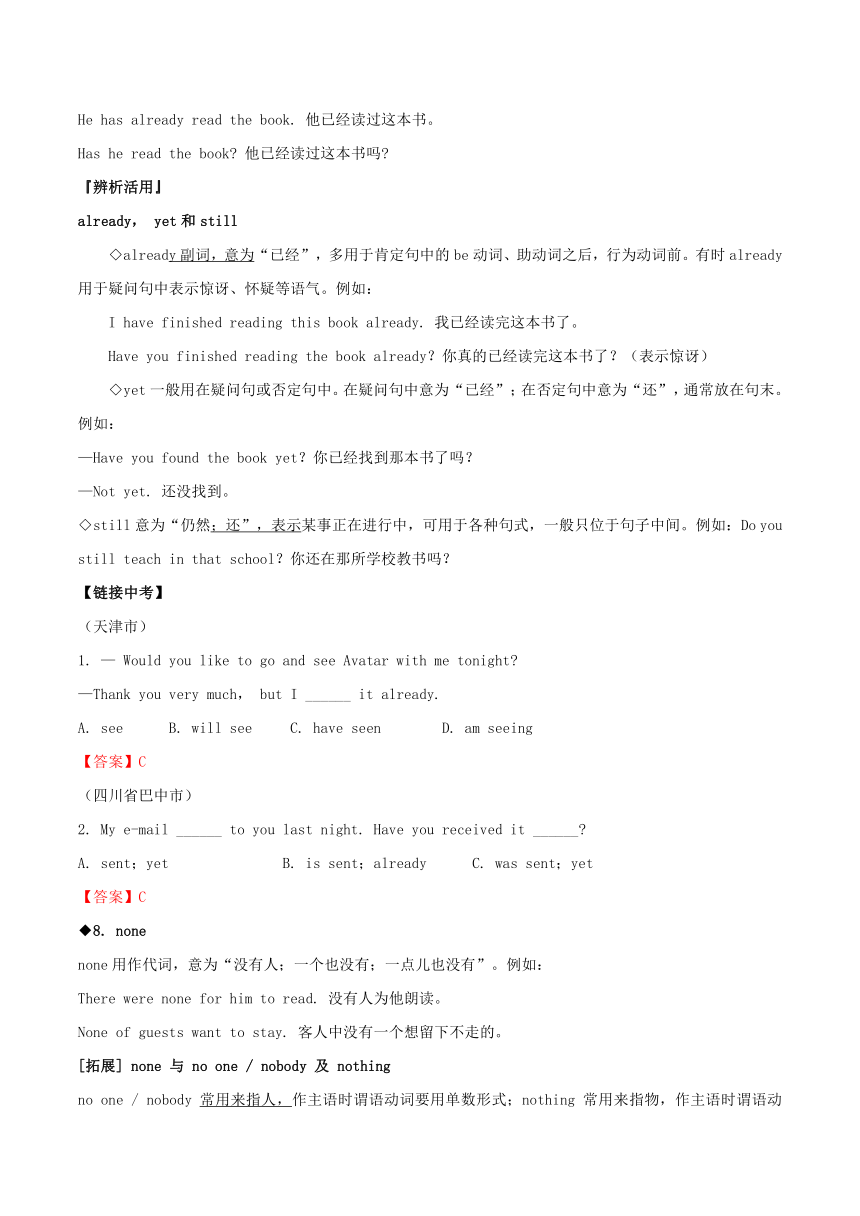
文档简介
Modules
1-6
必考词汇
◆1.
match
◇v.
(动词),意为“相配;十分相似;和……符合”。例如:
The
tie
matches
your
suit.
那条领带跟你的西装很相配。
It’s
difficult
to
match
the
color
of
old
paint.
很难找到和旧画颜色相配的色彩
◇
n.
(名词),意为“火柴,
比赛,
竞赛,
匹配,
(足球,
捧球,
蓝球)比赛”。例如:
We
had
a
friendly
match
with
them.
我们与他们进行了一场友谊比赛。
The
chairs
and
the
desk
are
a
good
match.
这些椅子和这种书桌很相配。
【链接中考】
(湖北省武汉市)
—Why
don’t
you
choose
the
red
tie
—For
me,
it
doesn’t
______
my
shirt
very
well.
A.
fix
B.
accept
C.
compare
D.
match
【答案】D
◆2.
advice
advice是不可数名词,意为“建议”,
( http: / / www.21cnjy.com )可用some,much,a
piece
of,pieces
of等修饰,不能说an
advice或many/
a
few
advices,表示“有关……的建议”时,用介词on接名词、代词或由疑问词引导的不定式。例如:
Let’s
ask
for
his
advice
on
what
to
do
next.
我们去征求一下他的意见下一步该怎么办。
『常用搭配』
give
advice
on对……提出建议
take/follow
one’s
advice接受某人的建议
ask
for
advice征求意见
act
on
one’s
advice照某人的建议去做
accept/refuse
one’s
advice接受(拒绝)某人的建议
offer
advice
to
sb.
向某人提供建议
动词形式为advise
『常用搭配』
advise
sb.
to
do
sth.
建议某人去做某事。例如:
My
teacher
advises
me
to
leave
now.
老师建议我现在就离开。
【链接中考】
(新疆省阜康市)
Mr.
Black
gave
us
______on
how
to
learn
English
well.
A.
an
advice
B.
many
advices
C.
some
advice
D.
some
advices
【答案】C
◆3.
hear
hear通常表示某种声音“进入我们的耳朵”。是听到、听见的意思,指听的能力和结果,但不一定指有意识地听。
例如:
Suddenly
I
heard
a
strange
noise.
我突然听到一种奇怪的响声。
『辨析活用』
◇
hear是“听见”、“听到”,不是有意识地听,侧重于“听”的结果。hear在作“听见”时,不能用现在进行时态中。
What
did
you
hear
just
now
你刚才听见什么了?
◇
listen是“听”,指有意识地倾听,
( http: / / www.21cnjy.com )但不一定听见,侧重于“听”的动作。listen是不及物动词,后面常用介词to。listen
to可以用在进行时态中。
Please
listen
to
the
teacher
carefully
in
class.
课堂上请认真听讲。
【链接中考】
(山东省菏泽市)
I’m
sorry,
I
didn’t
______
you
clearly.
Would
you
say
it
again
A.
hear
B.
notice
C.
see
D.
watch
【答案】A
◆4.
sound
⑴
sound作动词,意为“似乎;听起来”。例如:
His
explanation
sounds
all
right.
他的解释似乎有理。
Your
idea
sounds
a
good
one.
你的想法听起来很好。
⑵
sound为连系动词,后边接形容词,构成系表结构。表示“听起来……”。
That
sounds
interesting.
那听起来很有趣。
That
sounds
boring.
那听起来很无聊。
[拓展]类似的其他常用连系动词:
taste尝起来
feel感受到
touch摸起来
smell闻起来
look看起来
【链接中考】
(.
浙江省衢州市)
1.
—
Shall
we
go
for
a
picnic
in
the
park
this
Saturday
—Oh,
that
______
good.
A.
feels
B.
looks
C.
tastes
D.
Sounds
【答案】D
(湖北省黄冈市)
2.
—
Which
T-shirt
do
you
prefer
—The
red
one
.
It
______
more
comfortable.
A.
tastes
B.
smells
C.
feels
D.
sounds
【答案】C
(山东省潍坊市)
3.
The
cookies
______
good.
Could
I
have
some
more
A.
taste
B.
smell
C.
feel
D.
sound
【答案】A
◆5.
beside
beside作介词,意为“
(表示位置)在…旁边”。例如:
Here!
There’s
room
beside
me.
嘿!我旁边有空间。
『辨析活用』by,
beside和near
⑴
by和beside均表示“在……旁边”,常可换用。例如:
She
stood
by
the
window.
她站在窗边。
The
hotel
is
beside
(/by)
the
river.
那家饭店在河边。
Put
your
shoes
beside
mine.
把你的鞋子放在我的鞋子旁边。
⑵
near表示“在……附近”,表示的距离比by和beside稍远些,也时常换用。例如:
There
is
a
theatre
near
his
home.
他家附近有一家剧院。
There
is
a
post
office
near
No.
1
Middle
School.
第一中学附近有一所邮局。
【链接中考】
(山东省潍坊市)
The
little
elephant
i
( http: / / www.21cnjy.com )s
afraid
to
go
alone.
He
always
walks
______
his
mother.
A.
beside
B.
behind
C.
below
D.
under
【答案】A
◆6.
another
⑴
another作形容词,意为“再一,别的,不同的”。例如:
I’ll
give
you
another
example.
我再给你举个例子。
⑵another作代词,意为“另一个”。
例如:
I
don’t
like
this
shirt,
give
me
another
please.
我不喜欢这件衬衣,
请另外给我一件。
[拓展]another和the
other
◇another表示三个以上的人或物中同类的另一个;也可用作形容词,修饰后面的名词,意为“另一个,又一个”。
We
need
another
chair.
我们再要一把椅子。
I
don’t
wan
( http: / / www.21cnjy.com )t
the
green
apple.
Please
give
me
another.
我不想要这个箐苹果,请给我另一个吧。
◇the
other表示两个人或两个物中的另一个或另一部分,常与one搭配构成one…,
the
other…句型。
Hold
it
in
this
hand,
not
the
other.
用这只手握着,
不要用那只手。
【链接中考】
(江苏省连云港市)
1.
—
Would
you
like
to
have
_______
cake
—No,
thanks.
I’ve
had
two.
That’s
enough.
A.
other
B.
others
C.
another
D.
the
other
【答案】C
(上海市)
2.
New
Zealand
has
( http: / / www.21cnjy.com )two
islands.
One
is
North
Island
and
______
is
South
Island.
A.
another
B.
the
other
C.
other
D.
the
others
【答案】B
◆7.
already
already表示“已经”,通常用于肯定句,不用于否定句或疑问句(此时要用
yet)。例如:
He
has
already
read
the
book.
他已经读过这本书。
Has
he
read
the
book
他已经读过这本书吗
『辨析活用』
already,
yet和still
◇already副词,意为
( http: / / www.21cnjy.com )“已经”,多用于肯定句中的be动词、助动词之后,行为动词前。有时already用于疑问句中表示惊讶、怀疑等语气。例如:
I
have
finished
reading
this
book
already.
我已经读完这本书了。
Have
you
finished
reading
the
book
already?你真的已经读完这本书了?(表示惊讶)
◇yet一般用在疑问句或否定句中。在疑问句中意为“已经”;在否定句中意为“还”,通常放在句末。例如:
—Have
you
found
the
book
yet?你已经找到那本书了吗?
—Not
yet.
还没找到。
◇still意为“仍然;还”,表示
( http: / / www.21cnjy.com )某事正在进行中,可用于各种句式,一般只位于句子中间。例如:Do
you
still
teach
in
that
school?你还在那所学校教书吗?
【链接中考】
(天津市)
1.
—
Would
you
like
to
go
and
see
Avatar
with
me
tonight
—Thank
you
very
much,
but
I
______
it
already.
A.
see
B.
will
see
C.
have
seen
D.
am
seeing
【答案】C
(四川省巴中市)
2.
My
e-mail
______
to
you
last
night.
Have
you
received
it
______
A.
sent;yet
B.
is
sent;already
C.
was
sent;yet
【答案】C
◆8.
none
none用作代词,意为“没有人;一个也没有;一点儿也没有”。例如:
There
were
none
for
him
to
read.
没有人为他朗读。
None
of
guests
want
to
stay.
客人中没有一个想留下不走的。
[拓展]
none
与
no
one
/
nobody
及
nothing
no
one
/
nobody
常用来指人,
( http: / / www.21cnjy.com )作主语时谓语动词要用单数形式;nothing
常用来指物,作主语时谓语动词也要用单数形式;none
可指人也可指物,作主语时,如和of连用指不可数名词时,谓语动词要用单数形式;指可数名词时,谓语动词用单、复数均可。例如:
No
one
likes
a
person
with
bad
manners.
Nothing
is
difficult
in
the
world
if
you
put
your
heart
into
it.
None
of
them
has
/
have
seen
me
before.
None
of
this
money
belongs
to
me.
注意:
⑴
none
可与
of
连用表示范围,而
no
one
/
nobody
及
nothing
不可。
⑵
none
可用来回
( http: / / www.21cnjy.com )答
How
many
/
much…?
的特殊疑问句;而
no
one
/
nobody
及
nothing
则分别用来回答
Who…?
和
What…?
的特殊疑问句。例如:
—
How
many
birds
are
there
in
the
tree?
—
None.
—
What
is
in
the
box?
—
Nothing.
—
Who
is
in
the
classroom?
—
No
one
/
Nobody.
【链接中考】
(湖北省武汉市)
1.
—
How
many
students
are
there
in
the
classroom
—_______.
They
are
all
in
the
lab.
A.
Some
B.
None
C.
All
D.
Neither
【答案】B
(湖北省黄冈市)
2.
—
How
many
students
like
this
song
—
________
of
us
likes
it.
It
sounds
terrible.
A.
None
B.
Nobody
C.
Every
one
D.
All
【答案】A
◆9.
alone
⑴
alone用作形容词时,只能作表语
(不能作定语)。例如:
She
watches
TV
when
she
is
alone.
独自一人时,她便看电视。
⑵alone用作副词,除表示“独自”外,还可表示“仅仅”,注意要放在有关的词语之后。
例如:For
years
Mary
lived
alone
in
New
York.
玛丽孤身一人在纽约生活了好几年。
⑶alone可用
all,
much,
very
much
等修饰,但一般不用very
修饰。例如:
He
is
all
(much,
very
much)
alone.
他独自一人。
『辨析活用』alone和lonely
alone,
lonely同时作形容词时,
lonely表示感情内心上的孤独,
而alone是没有感彩的。例如:
I
am
alone
but
I
am
not
lonely,虽然我单独一人,但我并不感觉孤独.
When
his
wife
died,
he
was
very
lonely.
太太死后他非常孤独。
【链接中考】
(江苏省无锡市)
Though
his
grandmother
lives
______,
she
never
feels
______.
A.
alone;alone
B.
lonely;lonely
C.
alone;lonely
D.
lonely;alone
【答案】C
◆10.
prefer
prefer动词,意为“比较喜欢;更喜欢”。不能用于进行时态,其过去式和过去分词均为preferred。
Do
you
prefer
coffee
or
tea
你喜欢咖啡还是茶
[拓展]prefer的各种搭配为:
◇prefer…to…“与……相比更喜欢……”,其后接名词或动名词。
He
prefers
dogs
to
cats.
他很喜欢狗,而不喜欢猫。
I
prefer
skating
to
swimming.
与游泳相比我更喜欢滑冰。
◇prefer…rather
than…“宁可/宁愿……而不……”,其后接动词不定式,than后的不定式符号to常省去。
I
prefer
to
( http: / / www.21cnjy.com )stay
at
home
rather
than
go
to
the
cinema.
我宁愿呆在家里也不愿意去看电影。
【链接中考】
(四川省巴中市)
1.
They
preferred
______
rather
than
______
a
bike.
A.
to
walk;to
ride
B.
walking;riding
C.
to
walk;ride
【答案】C
(山东省泰安市)
2.
—
How
about
going
shopping
this
weekend,
Peter
—
Sorry.
I
prefer
______
rather
than
______.
A.
to
stay
at
home,
go
out
B.
to
go
out,
stay
at
home
C.
staying
at
home,
go
out
D.
going
out,
stay
at
home
【答案】A
◆11.
even
⑴
even
表示“甚至”,通常应放在被修饰词语之前,否则会引起含义的变化。例如:
Even
now
he
doesn’t
believe
me.
甚至到现在他还不相信我。(其它时候就不用说了)
Now
he
doesn’t
even
believe
me.
现在他甚至不相信我了。(其他方面的事就更不可能了)
⑵
用来修饰形容词或副词的比较级,表示“比(已经……的)更加……”。例如:
This
film
is
even
more
interesting
than
that
one.
这部电影比那部更有趣。
I
often
drive
fast,
but
he
drives
even
faster.
我经常开车开得很快,但他却开得更快。
『常用搭配』
even
if
即使,尽管。例如:
I
will
come
even
if
[even
though]
it
rains.
即使正雨我也会来。
Even
if
you
don’t
like
wine,
try
a
glass
of
this.
即使你不喜欢喝酒,也不妨尝尝这一杯。
【链接中考】
(台湾省)
Sandy:
How
was
your
vacation
in
America
Linda:
It
couldn’t
be
worse!
I
don’t
want
to
talk
about
it!
(A)
even
(B)
least
(C)
never
(D)
then
【答案】A
◆12.
since
since十时间点,表示“自从(过去某
( http: / / www.21cnjy.com )时)以来”,其着眼点是过去某时,即表示自过去某时延续至今的一段时间,常与现在完成时连用。since既可作介词,又可作从属连词。
⑴
作介词
She
has
worked
here
since
2000.
自2000年以来,她就在这里工作。
⑵
作从属连词
She
has
worked
here
since
she
left
school.
自她毕业以来,她就在这里工作。
[拓展]
for十时间段,表示“(延续)……之久
( http: / / www.21cnjy.com )”,其着眼点是现在,即表示延续到现在的一段时间(与现在完成时连用),或表示一段已经终结了的时间(与过去时连用),或表示将要延续的一段时间(与将来时连用)。
They
have
lived
in
China
for
two
years.
他们在中国已经住了两年。(现在还住在中国)
【链接中考】
(四川省卷)
1.
I
don’t
have
to
introduce
him
to
you
______
you
know
the
boy.
A.
until
B.
unless
C.
since
D.
but
【答案】C
(浙江省杭州市)
2.
—
How
long
have
you
been
collecting
shells
—______.
A.
After
I
left
school
B.
Before
I
moved
here
C.
When
I
went
to
the
beach
D.
Since
I
was
ten
years
old
【答案】D
常考短语
◆1.
enjoy
yourself
◇enjoy表示“喜欢”“享受”等,其后可接动名词作宾语,但不能是不定式。例如:
I
enjoyed
reading
these
books
very
much.
我很喜欢读这些书。
◇enjoy后接反身代词,表示“过
( http: / / www.21cnjy.com )得快活”,与
have
a
good
time同义,enjoy后所接的反身代词要与句子的主语相对应。例如:
He
enjoyed
himself
at
the
party.
他在晚会上玩得很开心。
I
hope
you
enjoy
yourself
this
evening.
我希望你今晚过得愉快。
◇enjoy
一般只用作及物动词,所以在通常情况下其后不能没有宾语。如:
—Did
you
enjoy
the
film
你喜欢这部电影吗
—Yes,
I
enjoyed
it
a
lot.
是的,很喜欢(from
21世纪教育网
yeeyi.
net)。
【链接中考】
(湖北省咸宁市)
1.
—
I
am
glad
to
be
( http: / / www.21cnjy.com )
invited
to
Susan’s
birthday
party
on
Friday
evening,
Mum.
—
yourself,
dear!
But
remember
to
be
back
before
10
o’clock.
A.
Help
B.
Believe
C.
Make
D.
Enjoy
【答案】D
(江苏省盐城市)
2.
—
How
was
your
visit
to
the
World
Park
in
Beijing
—Wonderful!
We
enjoyed
______very
much.
A.
itself
B.
myself
C.
yourselves
D.
ourselves
【答案】D
◆2.
take
off
◇take
off意为“起飞”。例如:
When
will
the
plane
take
off
飞机何时起飞?
What
was
the
girl
doing
when
the
UFO
took
off
当飞碟起飞时,女孩在干什么?
◇take
off还可以作“脱下”讲,反义词为put
on。例如:
Put
on
your
clothes.
Don’t
take
them
off.
把衣服穿上,别把衣服脱下。
【链接中考】
(天津市)
1.
The
plane
will
( http: / / www.21cnjy.com )______
from
Beijing
Capital
Airport
and
land
in
London
A.
take
up
B.
take
out
C.
take
away
D.
take
off
【答案】D
(青海省,宁夏)
2.
It’s
very
hot
here.
Why
not
______
your
coat
A.
have
on
B.
take
off
C.
put
off
D.
put
on
【答案】B
◆3.
look
after
look
after动词短语,意为“照管,照料,照料;注意,关心”。例如:
Don’t
worry,
Mum.
I
can
look
after
myself.
别担心,妈妈,我能照料自己。
We
look
after
the
baby
carefully.
我们小心地照看着婴儿。
『辨析活用』look
after与take
care
of
◇take
care
of与look
( http: / / www.21cnjy.com )after都能作“照顾、照料”解,可以互相替换。但look
after没有“保管、保护”的意思。例如:
She
stayed
at
home
and
took
care
of
her
mother
yesterday.
=She
stayed
at
home
and
looked
after
her
mother
yesterday.
昨天她呆在家里照料她母亲了。
◇take
good
care
of和look
after…well意义相同,都是“好好照料、好好照顾”的意思。
但要注意,take
care
of用的是good一词,而look
after则用well。例如:
Don’t
worry.
I
can
take
good
care
of
your
pet
while
you
are
away.
=Don’t
worry.
I
can
look
after
your
pet
well
while
you
are
away.
放心,你不在时,我会照料好你的宠物的。
【链接中考】
(湖北省荆州市)
—Peter,
what
if
your
parents
go
out
—They
ask
me
to
______
myself.
A.
look
after
B.
look
up
C.
look
for
D.
look
through
【答案】A
经典句型
◆1.
How
to
learn
English
这是疑问词+to不定式结构。动
( http: / / www.21cnjy.com )词不定式可以和疑问词what,
which,
how,
when,
where,
whether等连用,构成不定式短语,在句中常用作主语、表语或宾语。例如:
How
to
use
the
computer
is
a
question.
怎样使用这台计算机是个问题。(作主语)
The
question
is
when
to
start.
问题是何时出发。(作表语)
Could
you
tell
me
w
( http: / / www.21cnjy.com )hat
to
write
about
in
this
letter
你能告诉我在信里写什么吗?(作宾语)
能用这种不定式短语作宾语的动词有:tell,
show,
know,
learn,
forget等。
【链接中考】
(江苏省连云港市)
—We
can
use
QQ
to
communicate
with
each
other
online.
—Good.
Will
you
please
show
me
_______.
A.
which
to
use
B.
how
to
use
it
C.
what
to
use
D.
where
to
use
it
【答案】B
◆2.
That’s
a
good
idea.
当别人提出一个好的建议和想法时,我们通常用That’s
a
good
idea.来愉快地表示同意。例如:
—Why
don’t
you
ring
Mrs.
Smith?你为什么不给史密斯太太打个电话呢?
—That’s
a
good
idea.
是个好主意。
有时也说Good
ides.
/That’s
an
idea.
等。
—Let’s
go
out
for
a
walk,shall
we?我们出去散散步好吗?
—Good
idea.
Where
shall
we
go?好主意,我们去什么地方呢?
【链接中考】
(天津市)
—Shall
we
rais
( http: / / www.21cnjy.com )e
some
money
for
the
children
of
Yushu,
Qinghai
Province
—_______.
A.
I
see
B.
It’s
a
pleasure
C.
I
don’t
believe
it
D.
That’s
a
good
idea
【答案】D
◆3.
I’ve
never
been
to
Shanghai.
⑴
have
been
to表示某人“
( http: / / www.21cnjy.com )曾经去过某处”,表示此人有去过某地的经历,但此人现在在此处,它常与just,
ever,
never,
once,
twice,
several等连用。例如:
—Have
you
ever
been
to
the
Great
Wall
你曾经去过长城吗?
—Yes,
I’ve
ever
been
there
only
once.
是的,我曾去过那儿一次
⑵
have
gone
to
表示某人“到某处去了”,或在去的路上或已到某处,反正不在此地。一般不用第一二人称代词作句子的主语。例如:
—May
I
speak
to
Han
Mei
请韩梅接电话好吗?
—Sorry,
she’s
gone
to
the
library.
对不起,她去图书馆了。
⑶
have
been
in表示“已在
( http: / / www.21cnjy.com )某地”或者“在某地呆过”,其后常与“for+时间段”、“since+时间点或从句”等时间状语连用。例如:
He
has
been
in
Hainan
for
two
years.
他在海南二年了。
Jack
has
been
in
Xinjiang
since
last
year.
杰克自从去年以来就呆在新疆。
【链接中考】
(吉林省通化市)
1.
—
Where
are
the
Greens
,may
I
ask
—Well,
they
______
to
England.
They
have
been
there
for
nearly
a
week
now.
A.
have
been
B.
are
going
to
C.
have
gone
D.
will
go
【答案】A
(四川省巴中市)
2.
—
Could
you
tell
me
______
—
Yes.
He
______
to
Australia.
A.
where
is
he;has
gon
( http: / / www.21cnjy.com )e
B.
where
he
is;has
gone
C.
where
he
is;has
been
【答案】B
◆4.
But
I
get
on
well
with
her.
get
on
well
with
sb.
/
sth.
表示“和某人相处……”或“工作进展……”。表示工作进展时一般要用进行时。例如:
I
get
on
well
with
my
classmate.
我和同学相处的很好。
—How
are
you
getting
on
with
your
English
你英语学得怎么样?
—Very
well.
非常好。
【链接中考】
(广东省)
If
you
get
on
wel
( http: / / www.21cnjy.com )l
your
classmates,
you’ll
enjoy
your
school
life
more.
A.
to
B.
at
C.
with
D.
in
【答案】C
◆5.
You’ve
heard
of
him,
haven’t
you
反意疑问句前一部分为肯定句,后一部分用
( http: / / www.21cnjy.com )否定句;前一部分用否定句,后一部分则用肯定句,两部分在人称、时态上必须保持一致。反意疑问句要用Yes或No来回答,并要严格根据事实来回答。特别值得注意的是,对第二种结构的反意疑问句的回答,英汉表达不相同。
◇肯定反意疑问句的回答
当陈述部分为否定式,反意疑问句为肯定式时,其回答往往与汉语不一致,需特别引起注意:
—It
isn’t
cheap,
is
it
它不便宜吧
—Yes,
it
is.
不,很便宜。
—He
doesn’t
love
her,
does
he
他不爱她,是吗
—No,
he
doesn’t.
是的,他不爱她。
◇否定反意疑问句的回答
当陈述部分为肯定式,反意疑问句为否定式时,其回答一般不会造成困难,一般只需照情况回答即可:
—It’s
new,
isn’t
it
是新的,对吗
—Yes,
it
is.
对,是新的。
—He
wants
to
go,
doesn’t
he
他想去,对吗
—No,
he
doesn’t.
不,他不想去。
【链接中考】
(广西南宁)
1.
—
Hi,
Sam.
Your
mother’s
busy
these
days,
______
—The
meat.
A.
has
she
B.
is
she
C.
hasn’t
she
D.
isn’t
she
【答案】D
(浙江省杭州市)
2.
Alice
had
a
wonderful
time
yesterday,
______
A.
hadn’t
she
B.
wasn’t
she
C.
didn’t
she
D.
wouldn’t
she
【答案】C
1-6
必考词汇
◆1.
match
◇v.
(动词),意为“相配;十分相似;和……符合”。例如:
The
tie
matches
your
suit.
那条领带跟你的西装很相配。
It’s
difficult
to
match
the
color
of
old
paint.
很难找到和旧画颜色相配的色彩
◇
n.
(名词),意为“火柴,
比赛,
竞赛,
匹配,
(足球,
捧球,
蓝球)比赛”。例如:
We
had
a
friendly
match
with
them.
我们与他们进行了一场友谊比赛。
The
chairs
and
the
desk
are
a
good
match.
这些椅子和这种书桌很相配。
【链接中考】
(湖北省武汉市)
—Why
don’t
you
choose
the
red
tie
—For
me,
it
doesn’t
______
my
shirt
very
well.
A.
fix
B.
accept
C.
compare
D.
match
【答案】D
◆2.
advice
advice是不可数名词,意为“建议”,
( http: / / www.21cnjy.com )可用some,much,a
piece
of,pieces
of等修饰,不能说an
advice或many/
a
few
advices,表示“有关……的建议”时,用介词on接名词、代词或由疑问词引导的不定式。例如:
Let’s
ask
for
his
advice
on
what
to
do
next.
我们去征求一下他的意见下一步该怎么办。
『常用搭配』
give
advice
on对……提出建议
take/follow
one’s
advice接受某人的建议
ask
for
advice征求意见
act
on
one’s
advice照某人的建议去做
accept/refuse
one’s
advice接受(拒绝)某人的建议
offer
advice
to
sb.
向某人提供建议
动词形式为advise
『常用搭配』
advise
sb.
to
do
sth.
建议某人去做某事。例如:
My
teacher
advises
me
to
leave
now.
老师建议我现在就离开。
【链接中考】
(新疆省阜康市)
Mr.
Black
gave
us
______on
how
to
learn
English
well.
A.
an
advice
B.
many
advices
C.
some
advice
D.
some
advices
【答案】C
◆3.
hear
hear通常表示某种声音“进入我们的耳朵”。是听到、听见的意思,指听的能力和结果,但不一定指有意识地听。
例如:
Suddenly
I
heard
a
strange
noise.
我突然听到一种奇怪的响声。
『辨析活用』
◇
hear是“听见”、“听到”,不是有意识地听,侧重于“听”的结果。hear在作“听见”时,不能用现在进行时态中。
What
did
you
hear
just
now
你刚才听见什么了?
◇
listen是“听”,指有意识地倾听,
( http: / / www.21cnjy.com )但不一定听见,侧重于“听”的动作。listen是不及物动词,后面常用介词to。listen
to可以用在进行时态中。
Please
listen
to
the
teacher
carefully
in
class.
课堂上请认真听讲。
【链接中考】
(山东省菏泽市)
I’m
sorry,
I
didn’t
______
you
clearly.
Would
you
say
it
again
A.
hear
B.
notice
C.
see
D.
watch
【答案】A
◆4.
sound
⑴
sound作动词,意为“似乎;听起来”。例如:
His
explanation
sounds
all
right.
他的解释似乎有理。
Your
idea
sounds
a
good
one.
你的想法听起来很好。
⑵
sound为连系动词,后边接形容词,构成系表结构。表示“听起来……”。
That
sounds
interesting.
那听起来很有趣。
That
sounds
boring.
那听起来很无聊。
[拓展]类似的其他常用连系动词:
taste尝起来
feel感受到
touch摸起来
smell闻起来
look看起来
【链接中考】
(.
浙江省衢州市)
1.
—
Shall
we
go
for
a
picnic
in
the
park
this
Saturday
—Oh,
that
______
good.
A.
feels
B.
looks
C.
tastes
D.
Sounds
【答案】D
(湖北省黄冈市)
2.
—
Which
T-shirt
do
you
prefer
—The
red
one
.
It
______
more
comfortable.
A.
tastes
B.
smells
C.
feels
D.
sounds
【答案】C
(山东省潍坊市)
3.
The
cookies
______
good.
Could
I
have
some
more
A.
taste
B.
smell
C.
feel
D.
sound
【答案】A
◆5.
beside
beside作介词,意为“
(表示位置)在…旁边”。例如:
Here!
There’s
room
beside
me.
嘿!我旁边有空间。
『辨析活用』by,
beside和near
⑴
by和beside均表示“在……旁边”,常可换用。例如:
She
stood
by
the
window.
她站在窗边。
The
hotel
is
beside
(/by)
the
river.
那家饭店在河边。
Put
your
shoes
beside
mine.
把你的鞋子放在我的鞋子旁边。
⑵
near表示“在……附近”,表示的距离比by和beside稍远些,也时常换用。例如:
There
is
a
theatre
near
his
home.
他家附近有一家剧院。
There
is
a
post
office
near
No.
1
Middle
School.
第一中学附近有一所邮局。
【链接中考】
(山东省潍坊市)
The
little
elephant
i
( http: / / www.21cnjy.com )s
afraid
to
go
alone.
He
always
walks
______
his
mother.
A.
beside
B.
behind
C.
below
D.
under
【答案】A
◆6.
another
⑴
another作形容词,意为“再一,别的,不同的”。例如:
I’ll
give
you
another
example.
我再给你举个例子。
⑵another作代词,意为“另一个”。
例如:
I
don’t
like
this
shirt,
give
me
another
please.
我不喜欢这件衬衣,
请另外给我一件。
[拓展]another和the
other
◇another表示三个以上的人或物中同类的另一个;也可用作形容词,修饰后面的名词,意为“另一个,又一个”。
We
need
another
chair.
我们再要一把椅子。
I
don’t
wan
( http: / / www.21cnjy.com )t
the
green
apple.
Please
give
me
another.
我不想要这个箐苹果,请给我另一个吧。
◇the
other表示两个人或两个物中的另一个或另一部分,常与one搭配构成one…,
the
other…句型。
Hold
it
in
this
hand,
not
the
other.
用这只手握着,
不要用那只手。
【链接中考】
(江苏省连云港市)
1.
—
Would
you
like
to
have
_______
cake
—No,
thanks.
I’ve
had
two.
That’s
enough.
A.
other
B.
others
C.
another
D.
the
other
【答案】C
(上海市)
2.
New
Zealand
has
( http: / / www.21cnjy.com )two
islands.
One
is
North
Island
and
______
is
South
Island.
A.
another
B.
the
other
C.
other
D.
the
others
【答案】B
◆7.
already
already表示“已经”,通常用于肯定句,不用于否定句或疑问句(此时要用
yet)。例如:
He
has
already
read
the
book.
他已经读过这本书。
Has
he
read
the
book
他已经读过这本书吗
『辨析活用』
already,
yet和still
◇already副词,意为
( http: / / www.21cnjy.com )“已经”,多用于肯定句中的be动词、助动词之后,行为动词前。有时already用于疑问句中表示惊讶、怀疑等语气。例如:
I
have
finished
reading
this
book
already.
我已经读完这本书了。
Have
you
finished
reading
the
book
already?你真的已经读完这本书了?(表示惊讶)
◇yet一般用在疑问句或否定句中。在疑问句中意为“已经”;在否定句中意为“还”,通常放在句末。例如:
—Have
you
found
the
book
yet?你已经找到那本书了吗?
—Not
yet.
还没找到。
◇still意为“仍然;还”,表示
( http: / / www.21cnjy.com )某事正在进行中,可用于各种句式,一般只位于句子中间。例如:Do
you
still
teach
in
that
school?你还在那所学校教书吗?
【链接中考】
(天津市)
1.
—
Would
you
like
to
go
and
see
Avatar
with
me
tonight
—Thank
you
very
much,
but
I
______
it
already.
A.
see
B.
will
see
C.
have
seen
D.
am
seeing
【答案】C
(四川省巴中市)
2.
My
______
to
you
last
night.
Have
you
received
it
______
A.
sent;yet
B.
is
sent;already
C.
was
sent;yet
【答案】C
◆8.
none
none用作代词,意为“没有人;一个也没有;一点儿也没有”。例如:
There
were
none
for
him
to
read.
没有人为他朗读。
None
of
guests
want
to
stay.
客人中没有一个想留下不走的。
[拓展]
none
与
no
one
/
nobody
及
nothing
no
one
/
nobody
常用来指人,
( http: / / www.21cnjy.com )作主语时谓语动词要用单数形式;nothing
常用来指物,作主语时谓语动词也要用单数形式;none
可指人也可指物,作主语时,如和of连用指不可数名词时,谓语动词要用单数形式;指可数名词时,谓语动词用单、复数均可。例如:
No
one
likes
a
person
with
bad
manners.
Nothing
is
difficult
in
the
world
if
you
put
your
heart
into
it.
None
of
them
has
/
have
seen
me
before.
None
of
this
money
belongs
to
me.
注意:
⑴
none
可与
of
连用表示范围,而
no
one
/
nobody
及
nothing
不可。
⑵
none
可用来回
( http: / / www.21cnjy.com )答
How
many
/
much…?
的特殊疑问句;而
no
one
/
nobody
及
nothing
则分别用来回答
Who…?
和
What…?
的特殊疑问句。例如:
—
How
many
birds
are
there
in
the
tree?
—
None.
—
What
is
in
the
box?
—
Nothing.
—
Who
is
in
the
classroom?
—
No
one
/
Nobody.
【链接中考】
(湖北省武汉市)
1.
—
How
many
students
are
there
in
the
classroom
—_______.
They
are
all
in
the
lab.
A.
Some
B.
None
C.
All
D.
Neither
【答案】B
(湖北省黄冈市)
2.
—
How
many
students
like
this
song
—
________
of
us
likes
it.
It
sounds
terrible.
A.
None
B.
Nobody
C.
Every
one
D.
All
【答案】A
◆9.
alone
⑴
alone用作形容词时,只能作表语
(不能作定语)。例如:
She
watches
TV
when
she
is
alone.
独自一人时,她便看电视。
⑵alone用作副词,除表示“独自”外,还可表示“仅仅”,注意要放在有关的词语之后。
例如:For
years
Mary
lived
alone
in
New
York.
玛丽孤身一人在纽约生活了好几年。
⑶alone可用
all,
much,
very
much
等修饰,但一般不用very
修饰。例如:
He
is
all
(much,
very
much)
alone.
他独自一人。
『辨析活用』alone和lonely
alone,
lonely同时作形容词时,
lonely表示感情内心上的孤独,
而alone是没有感彩的。例如:
I
am
alone
but
I
am
not
lonely,虽然我单独一人,但我并不感觉孤独.
When
his
wife
died,
he
was
very
lonely.
太太死后他非常孤独。
【链接中考】
(江苏省无锡市)
Though
his
grandmother
lives
______,
she
never
feels
______.
A.
alone;alone
B.
lonely;lonely
C.
alone;lonely
D.
lonely;alone
【答案】C
◆10.
prefer
prefer动词,意为“比较喜欢;更喜欢”。不能用于进行时态,其过去式和过去分词均为preferred。
Do
you
prefer
coffee
or
tea
你喜欢咖啡还是茶
[拓展]prefer的各种搭配为:
◇prefer…to…“与……相比更喜欢……”,其后接名词或动名词。
He
prefers
dogs
to
cats.
他很喜欢狗,而不喜欢猫。
I
prefer
skating
to
swimming.
与游泳相比我更喜欢滑冰。
◇prefer…rather
than…“宁可/宁愿……而不……”,其后接动词不定式,than后的不定式符号to常省去。
I
prefer
to
( http: / / www.21cnjy.com )stay
at
home
rather
than
go
to
the
cinema.
我宁愿呆在家里也不愿意去看电影。
【链接中考】
(四川省巴中市)
1.
They
preferred
______
rather
than
______
a
bike.
A.
to
walk;to
ride
B.
walking;riding
C.
to
walk;ride
【答案】C
(山东省泰安市)
2.
—
How
about
going
shopping
this
weekend,
Peter
—
Sorry.
I
prefer
______
rather
than
______.
A.
to
stay
at
home,
go
out
B.
to
go
out,
stay
at
home
C.
staying
at
home,
go
out
D.
going
out,
stay
at
home
【答案】A
◆11.
even
⑴
even
表示“甚至”,通常应放在被修饰词语之前,否则会引起含义的变化。例如:
Even
now
he
doesn’t
believe
me.
甚至到现在他还不相信我。(其它时候就不用说了)
Now
he
doesn’t
even
believe
me.
现在他甚至不相信我了。(其他方面的事就更不可能了)
⑵
用来修饰形容词或副词的比较级,表示“比(已经……的)更加……”。例如:
This
film
is
even
more
interesting
than
that
one.
这部电影比那部更有趣。
I
often
drive
fast,
but
he
drives
even
faster.
我经常开车开得很快,但他却开得更快。
『常用搭配』
even
if
即使,尽管。例如:
I
will
come
even
if
[even
though]
it
rains.
即使正雨我也会来。
Even
if
you
don’t
like
wine,
try
a
glass
of
this.
即使你不喜欢喝酒,也不妨尝尝这一杯。
【链接中考】
(台湾省)
Sandy:
How
was
your
vacation
in
America
Linda:
It
couldn’t
be
worse!
I
don’t
want
to
talk
about
it!
(A)
even
(B)
least
(C)
never
(D)
then
【答案】A
◆12.
since
since十时间点,表示“自从(过去某
( http: / / www.21cnjy.com )时)以来”,其着眼点是过去某时,即表示自过去某时延续至今的一段时间,常与现在完成时连用。since既可作介词,又可作从属连词。
⑴
作介词
She
has
worked
here
since
2000.
自2000年以来,她就在这里工作。
⑵
作从属连词
She
has
worked
here
since
she
left
school.
自她毕业以来,她就在这里工作。
[拓展]
for十时间段,表示“(延续)……之久
( http: / / www.21cnjy.com )”,其着眼点是现在,即表示延续到现在的一段时间(与现在完成时连用),或表示一段已经终结了的时间(与过去时连用),或表示将要延续的一段时间(与将来时连用)。
They
have
lived
in
China
for
two
years.
他们在中国已经住了两年。(现在还住在中国)
【链接中考】
(四川省卷)
1.
I
don’t
have
to
introduce
him
to
you
______
you
know
the
boy.
A.
until
B.
unless
C.
since
D.
but
【答案】C
(浙江省杭州市)
2.
—
How
long
have
you
been
collecting
shells
—______.
A.
After
I
left
school
B.
Before
I
moved
here
C.
When
I
went
to
the
beach
D.
Since
I
was
ten
years
old
【答案】D
常考短语
◆1.
enjoy
yourself
◇enjoy表示“喜欢”“享受”等,其后可接动名词作宾语,但不能是不定式。例如:
I
enjoyed
reading
these
books
very
much.
我很喜欢读这些书。
◇enjoy后接反身代词,表示“过
( http: / / www.21cnjy.com )得快活”,与
have
a
good
time同义,enjoy后所接的反身代词要与句子的主语相对应。例如:
He
enjoyed
himself
at
the
party.
他在晚会上玩得很开心。
I
hope
you
enjoy
yourself
this
evening.
我希望你今晚过得愉快。
◇enjoy
一般只用作及物动词,所以在通常情况下其后不能没有宾语。如:
—Did
you
enjoy
the
film
你喜欢这部电影吗
—Yes,
I
enjoyed
it
a
lot.
是的,很喜欢(from
21世纪教育网
yeeyi.
net)。
【链接中考】
(湖北省咸宁市)
1.
—
I
am
glad
to
be
( http: / / www.21cnjy.com )
invited
to
Susan’s
birthday
party
on
Friday
evening,
Mum.
—
yourself,
dear!
But
remember
to
be
back
before
10
o’clock.
A.
Help
B.
Believe
C.
Make
D.
Enjoy
【答案】D
(江苏省盐城市)
2.
—
How
was
your
visit
to
the
World
Park
in
Beijing
—Wonderful!
We
enjoyed
______very
much.
A.
itself
B.
myself
C.
yourselves
D.
ourselves
【答案】D
◆2.
take
off
◇take
off意为“起飞”。例如:
When
will
the
plane
take
off
飞机何时起飞?
What
was
the
girl
doing
when
the
UFO
took
off
当飞碟起飞时,女孩在干什么?
◇take
off还可以作“脱下”讲,反义词为put
on。例如:
Put
on
your
clothes.
Don’t
take
them
off.
把衣服穿上,别把衣服脱下。
【链接中考】
(天津市)
1.
The
plane
will
( http: / / www.21cnjy.com )______
from
Beijing
Capital
Airport
and
land
in
London
A.
take
up
B.
take
out
C.
take
away
D.
take
off
【答案】D
(青海省,宁夏)
2.
It’s
very
hot
here.
Why
not
______
your
coat
A.
have
on
B.
take
off
C.
put
off
D.
put
on
【答案】B
◆3.
look
after
look
after动词短语,意为“照管,照料,照料;注意,关心”。例如:
Don’t
worry,
Mum.
I
can
look
after
myself.
别担心,妈妈,我能照料自己。
We
look
after
the
baby
carefully.
我们小心地照看着婴儿。
『辨析活用』look
after与take
care
of
◇take
care
of与look
( http: / / www.21cnjy.com )after都能作“照顾、照料”解,可以互相替换。但look
after没有“保管、保护”的意思。例如:
She
stayed
at
home
and
took
care
of
her
mother
yesterday.
=She
stayed
at
home
and
looked
after
her
mother
yesterday.
昨天她呆在家里照料她母亲了。
◇take
good
care
of和look
after…well意义相同,都是“好好照料、好好照顾”的意思。
但要注意,take
care
of用的是good一词,而look
after则用well。例如:
Don’t
worry.
I
can
take
good
care
of
your
pet
while
you
are
away.
=Don’t
worry.
I
can
look
after
your
pet
well
while
you
are
away.
放心,你不在时,我会照料好你的宠物的。
【链接中考】
(湖北省荆州市)
—Peter,
what
if
your
parents
go
out
—They
ask
me
to
______
myself.
A.
look
after
B.
look
up
C.
look
for
D.
look
through
【答案】A
经典句型
◆1.
How
to
learn
English
这是疑问词+to不定式结构。动
( http: / / www.21cnjy.com )词不定式可以和疑问词what,
which,
how,
when,
where,
whether等连用,构成不定式短语,在句中常用作主语、表语或宾语。例如:
How
to
use
the
computer
is
a
question.
怎样使用这台计算机是个问题。(作主语)
The
question
is
when
to
start.
问题是何时出发。(作表语)
Could
you
tell
me
w
( http: / / www.21cnjy.com )hat
to
write
about
in
this
letter
你能告诉我在信里写什么吗?(作宾语)
能用这种不定式短语作宾语的动词有:tell,
show,
know,
learn,
forget等。
【链接中考】
(江苏省连云港市)
—We
can
use
to
communicate
with
each
other
online.
—Good.
Will
you
please
show
me
_______.
A.
which
to
use
B.
how
to
use
it
C.
what
to
use
D.
where
to
use
it
【答案】B
◆2.
That’s
a
good
idea.
当别人提出一个好的建议和想法时,我们通常用That’s
a
good
idea.来愉快地表示同意。例如:
—Why
don’t
you
ring
Mrs.
Smith?你为什么不给史密斯太太打个电话呢?
—That’s
a
good
idea.
是个好主意。
有时也说Good
ides.
/That’s
an
idea.
等。
—Let’s
go
out
for
a
walk,shall
we?我们出去散散步好吗?
—Good
idea.
Where
shall
we
go?好主意,我们去什么地方呢?
【链接中考】
(天津市)
—Shall
we
rais
( http: / / www.21cnjy.com )e
some
money
for
the
children
of
Yushu,
Qinghai
Province
—_______.
A.
I
see
B.
It’s
a
pleasure
C.
I
don’t
believe
it
D.
That’s
a
good
idea
【答案】D
◆3.
I’ve
never
been
to
Shanghai.
⑴
have
been
to表示某人“
( http: / / www.21cnjy.com )曾经去过某处”,表示此人有去过某地的经历,但此人现在在此处,它常与just,
ever,
never,
once,
twice,
several等连用。例如:
—Have
you
ever
been
to
the
Great
Wall
你曾经去过长城吗?
—Yes,
I’ve
ever
been
there
only
once.
是的,我曾去过那儿一次
⑵
have
gone
to
表示某人“到某处去了”,或在去的路上或已到某处,反正不在此地。一般不用第一二人称代词作句子的主语。例如:
—May
I
speak
to
Han
Mei
请韩梅接电话好吗?
—Sorry,
she’s
gone
to
the
library.
对不起,她去图书馆了。
⑶
have
been
in表示“已在
( http: / / www.21cnjy.com )某地”或者“在某地呆过”,其后常与“for+时间段”、“since+时间点或从句”等时间状语连用。例如:
He
has
been
in
Hainan
for
two
years.
他在海南二年了。
Jack
has
been
in
Xinjiang
since
last
year.
杰克自从去年以来就呆在新疆。
【链接中考】
(吉林省通化市)
1.
—
Where
are
the
Greens
,may
I
ask
—Well,
they
______
to
England.
They
have
been
there
for
nearly
a
week
now.
A.
have
been
B.
are
going
to
C.
have
gone
D.
will
go
【答案】A
(四川省巴中市)
2.
—
Could
you
tell
me
______
—
Yes.
He
______
to
Australia.
A.
where
is
he;has
gon
( http: / / www.21cnjy.com )e
B.
where
he
is;has
gone
C.
where
he
is;has
been
【答案】B
◆4.
But
I
get
on
well
with
her.
get
on
well
with
sb.
/
sth.
表示“和某人相处……”或“工作进展……”。表示工作进展时一般要用进行时。例如:
I
get
on
well
with
my
classmate.
我和同学相处的很好。
—How
are
you
getting
on
with
your
English
你英语学得怎么样?
—Very
well.
非常好。
【链接中考】
(广东省)
If
you
get
on
wel
( http: / / www.21cnjy.com )l
your
classmates,
you’ll
enjoy
your
school
life
more.
A.
to
B.
at
C.
with
D.
in
【答案】C
◆5.
You’ve
heard
of
him,
haven’t
you
反意疑问句前一部分为肯定句,后一部分用
( http: / / www.21cnjy.com )否定句;前一部分用否定句,后一部分则用肯定句,两部分在人称、时态上必须保持一致。反意疑问句要用Yes或No来回答,并要严格根据事实来回答。特别值得注意的是,对第二种结构的反意疑问句的回答,英汉表达不相同。
◇肯定反意疑问句的回答
当陈述部分为否定式,反意疑问句为肯定式时,其回答往往与汉语不一致,需特别引起注意:
—It
isn’t
cheap,
is
it
它不便宜吧
—Yes,
it
is.
不,很便宜。
—He
doesn’t
love
her,
does
he
他不爱她,是吗
—No,
he
doesn’t.
是的,他不爱她。
◇否定反意疑问句的回答
当陈述部分为肯定式,反意疑问句为否定式时,其回答一般不会造成困难,一般只需照情况回答即可:
—It’s
new,
isn’t
it
是新的,对吗
—Yes,
it
is.
对,是新的。
—He
wants
to
go,
doesn’t
he
他想去,对吗
—No,
he
doesn’t.
不,他不想去。
【链接中考】
(广西南宁)
1.
—
Hi,
Sam.
Your
mother’s
busy
these
days,
______
—The
meat.
A.
has
she
B.
is
she
C.
hasn’t
she
D.
isn’t
she
【答案】D
(浙江省杭州市)
2.
Alice
had
a
wonderful
time
yesterday,
______
A.
hadn’t
she
B.
wasn’t
she
C.
didn’t
she
D.
wouldn’t
she
【答案】C
